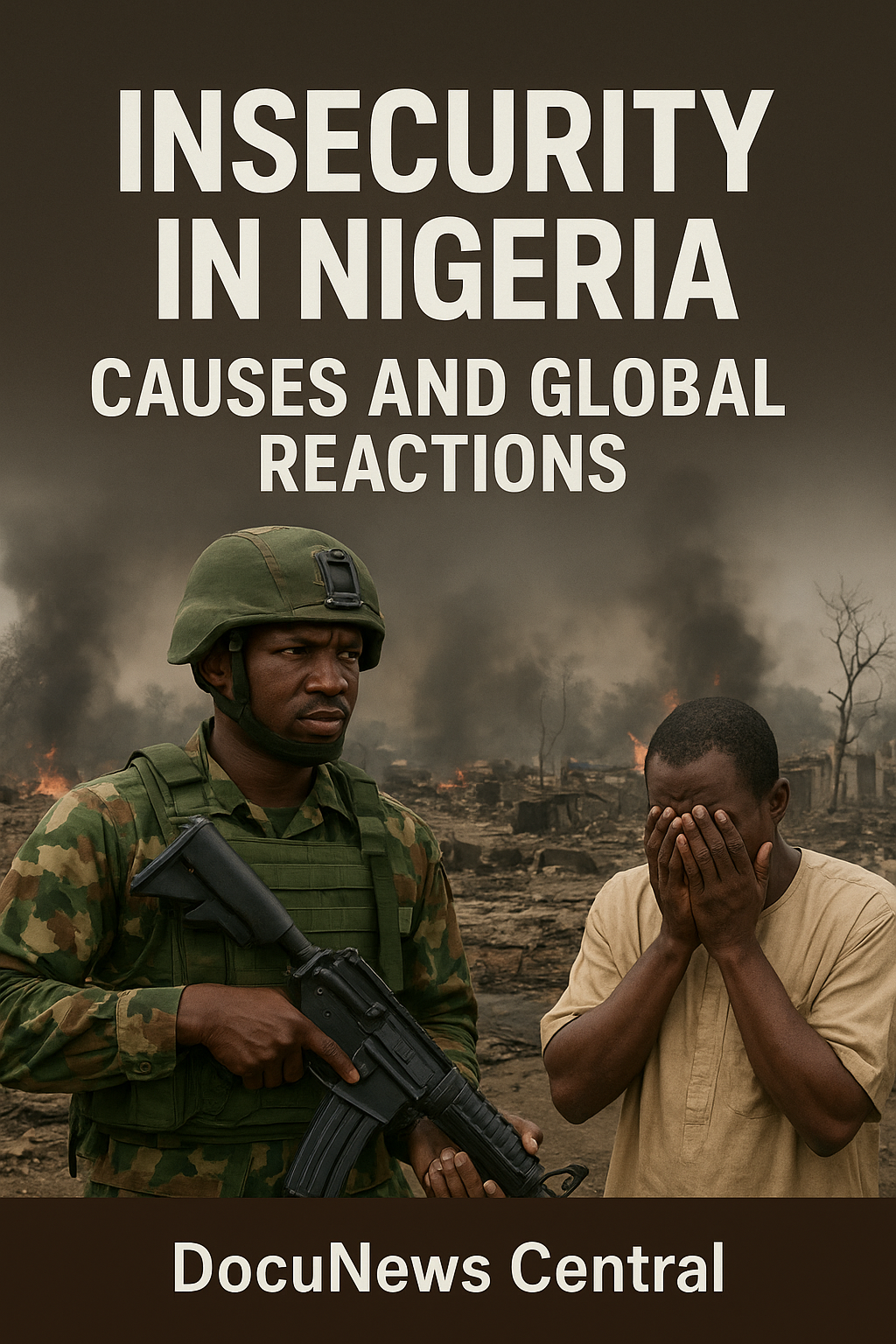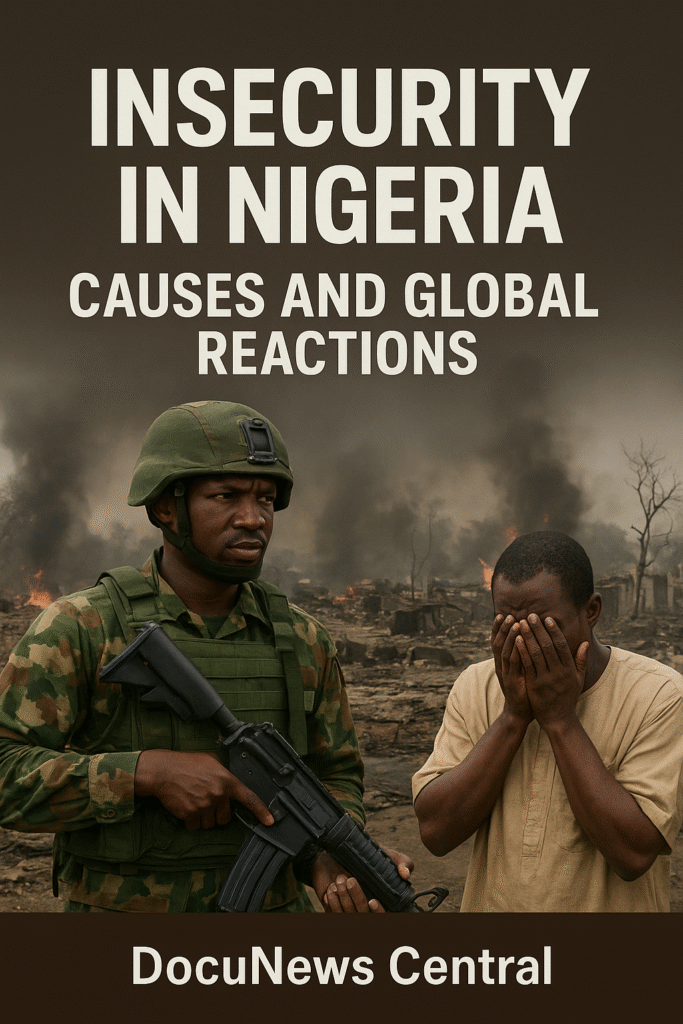

Insecurity in Nigeria: Causes and Global Reactions
Insecurity in Nigeria has become one of the most persistent challenges confronting Africa’s most populous nation. From terrorism to banditry, kidnappings, and communal clashes, the country continues to struggle with a cycle of violence that affects both citizens and the economy. Understanding the root causes and global reactions to this issue provides insight into how Nigeria can chart a path toward sustainable peace.
Understanding the Root Causes of Insecurity in Nigeria
The rise of insecurity in Nigeria is not a sudden occurrence. It stems from years of poor governance, corruption, unemployment, and socio-political instability. The combination of these factors has created an environment where extremist groups and criminal networks thrive.
1. Poverty and Unemployment
Millions of Nigerians live below the poverty line, while unemployment continues to rise. As opportunities shrink, young people become more vulnerable to recruitment by extremist groups and criminal organizations. This trend has been most visible in the northern part of the country, where groups like Boko Haram have exploited poverty and frustration to gain followers.
2. Corruption and Weak Governance
Corruption has crippled Nigeria’s ability to effectively respond to security challenges. Funds meant for military operations are often mismanaged, leaving the armed forces ill-equipped. In addition, political leaders sometimes prioritize personal interests over national security. This governance gap continues to weaken public trust and deepen instability.
3. Ethno-Religious Conflicts
Ethnic and religious divisions have also contributed significantly to Nigeria’s insecurity. Tensions between farmers and herders, Christians and Muslims, and among various ethnic groups often lead to violent clashes. Such conflicts are frequently fueled by political manipulation, disinformation, and competition for resources.
4. Terrorism and Banditry
The activities of terrorist groups like Boko Haram and the Islamic State in West Africa Province (ISWAP) have devastated communities, displaced millions, and destroyed livelihoods. Similarly, banditry and kidnappings for ransom have spread from the north to other regions, making daily life unsafe for ordinary Nigerians.
The Economic Impact of Insecurity
Insecurity has had a devastating effect on Nigeria’s economy. Investors hesitate to commit resources, farmers abandon their fields, and industries suffer supply chain disruptions. Tourism, trade, and education have also been affected. According to local reports, billions of naira are lost annually due to violence and instability.
Additionally, insecurity has triggered massive internal displacement. Thousands of families now live in camps, depending on humanitarian aid for survival. The social cost of this displacement cannot be ignored, as it leads to broken families, trauma, and a decline in human capital.
Government Efforts to Address Insecurity
The Nigerian government has launched various initiatives to tackle insecurity, including military operations, community policing, and intelligence reforms. While these efforts have yielded some results, they remain insufficient. The fight against terrorism requires not only weapons but also strong institutions, transparency, and public cooperation.
Efforts like the Nigerian Army’s operations against bandits and regional collaboration with neighboring countries under the Multinational Joint Task Force (MNJTF) show some progress. However, inconsistent funding and lack of political will continue to undermine these strategies.
Global Reactions to Nigeria’s Insecurity
The international community has expressed deep concern over Nigeria’s security challenges. Nations such as the United States, the United Kingdom, and France have offered military training, intelligence sharing, and humanitarian assistance. Global organizations like the United Nations and Amnesty International have also condemned human rights abuses committed during counterterrorism operations.
Recently, the intersection of religion and politics in Nigeria’s security crisis has drawn global attention. Many analysts argue that tackling insecurity requires addressing both the socio-economic roots and the ideological drivers of extremism.
Foreign Aid and International Cooperation
Foreign partners have supported Nigeria with funding, training, and equipment. The U.S. has delivered aircraft for counterterrorism operations, while the European Union has invested in humanitarian support for displaced persons. Yet, global partners continue to urge Nigerian leaders to improve accountability and human rights standards within the military.
Global Media and Advocacy
International media coverage has increased awareness about Nigeria’s insecurity, placing pressure on the government to act decisively. Advocacy groups and NGOs have also amplified the voices of victims, urging transparency and justice for communities affected by violence.
The Way Forward
To overcome insecurity, Nigeria must focus on long-term reforms. Strengthening institutions, creating jobs, promoting education, and ensuring equitable resource distribution are critical steps. The government must also enhance trust by upholding justice, improving security personnel welfare, and involving local communities in peace-building.
Ultimately, Nigeria’s path to security lies in unity, accountability, and genuine leadership. With coordinated domestic action and sustained international support, the nation can reverse the tide of insecurity and rebuild hope for its people.
Conclusion
Insecurity in Nigeria remains a multifaceted problem with deep historical and socio-economic roots. While global partners continue to show concern, the true solution lies within Nigeria’s ability to confront corruption, strengthen governance, and empower its citizens. As peace efforts continue, the world watches with cautious optimism, hoping that Africa’s largest democracy will finally find lasting stability.






